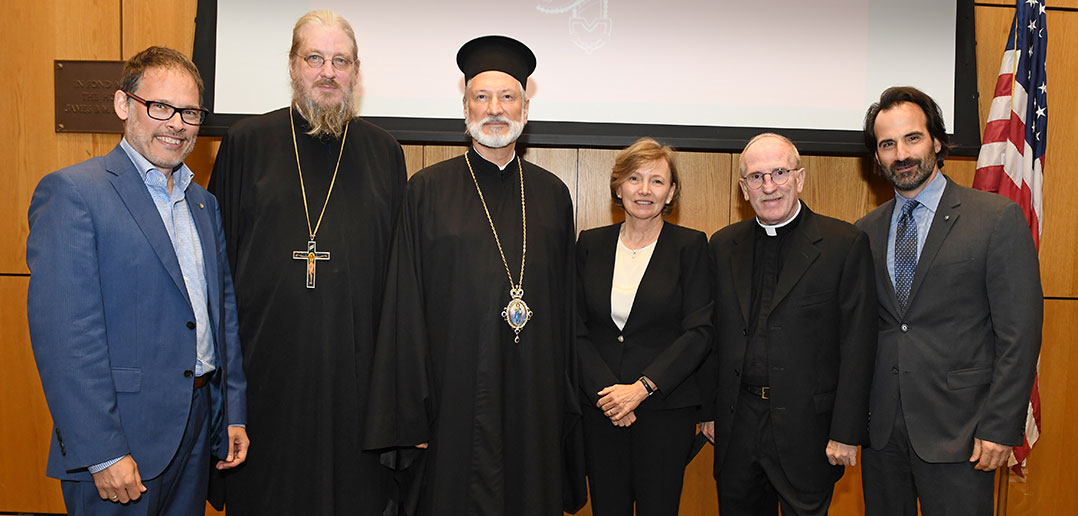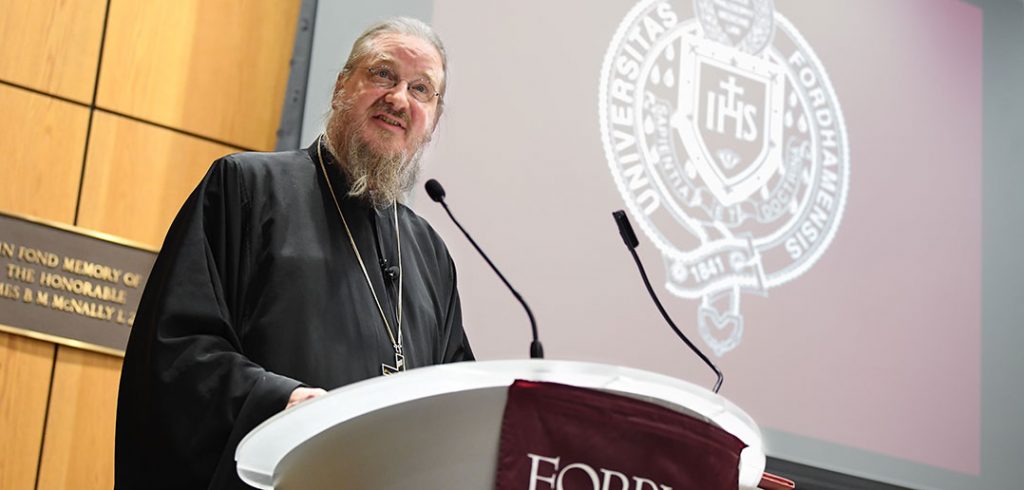“The task of theological education is not to enable students to answer questions that arise today, but to be able to respond to those that will be raised in the decades to come,” said the Very Rev. Dr. John Behr, the Father Georges Florovsky Distinguished Professor of Patristics at St. Vladimir’s Orthodox Theological Seminary.
Father Behr’s lecture, “Theological Education in the Twenty-First Century,” delivered Sept. 24 in the McNally Amphitheatre at Fordham’s Lincoln Center campus, explored the high calling taken up by teachers of theology and the challenges they face in a complex and changing modern world.
Father Behr, one of the world’s leading scholars of early Christianity, will join the University of Aberdeen next year as a professor of divinity. The Orthodoxy in America lecture is a signature annual event of Fordham’s Orthodox Christian Studies Center that has featured some of the Orthodox world’s most influential thinkers since 2004.
“Theological education really is at the heart of the Christian faith,” Father Behr said. “It goes back to the mandate of Christ himself: ‘Go therefore and make disciples, baptizing them in the name of the Father, the Son, and the Holy Spirit.’”
The imperative to make disciples, Father Behr continued, “is a matter of teaching—making students of the words.” And the goal of theological education, he said, is “forming theologians—ones who can speak in new and yet unforeseen contexts.”
Training future theologians, Father Behr acknowledged, does, of course, involve the transmission of a great deal of information and skills—encompassing a range of disciplines, including languages, history, liturgy, iconography, pastoral ministry, and public speaking. However, he continued, “Theology is not simply a matter of handing down information, a static set of propositions—as if teachers of theology were simply UPS delivery persons handing over a package without having contributed anything to that package themselves.”
Rather, teachers of theology impart their own wisdom as they pass along the lessons of their forebears. “Tradition is not simply a repetition, but a creative fidelity,” Father Behr said, borrowing a phrase from the Orthodox theologian Kallistos Ware.
Theology as Symphony
To illustrate this formulation, Father Behr likened theology to a symphony comprising the multitude of voices that have shaped Christian thought across centuries and continents. Listening to theology as a symphony, he said, allows us to hear both the orchestra as a whole as well each individual voice. “Each voice must be heard in its full particularity, and in its full particularity contributes to the polyphonous nature of a symphony,” Behr said.
The symphony of theology, in Father Behr’s formulation, is a living composition to be rehearsed and performed anew by each successive generation of theologians. “We rehearse the symphony so that we ourselves can be harmonized into the symphony and so take our part today to sing in that symphony with new voices—with themes and movements that might well be different from what went before, yet part of the same symphony,” he said.
“We must sing in the present—addressing the concerns of the present and using the language of the present—if we’re going to have anything to say and any hope of being heard.”
Transforming Our Vision
To contribute to this ongoing symphony is an essential task, Father Behr stressed. “We must be ready to give a good account of the hope that is in us to all those who ask, as the Apostle Peter demands of us,” he said.
“The task of theology is transformation: transforming our vision so that we might ourselves be transformed,” Father Behr said, adding that this theological vision can allow us “to see everything in the light of Christ.”
Joseph M. McShane, S.J., president of Fordham, praised Father Behr for his reverence and humor in comments following the lecture. “You spoke with experience, you spoke from the heart, and you spoke with loving wisdom about the transmission of the wisdom of love,” Father McShane said.
In his conclusion, His Grace Bishop Irinej of the Serbian Orthodox Diocese of Eastern America thanked Father Behr “for taking tradition out of the formaldehyde in which it is so often placed, and rather bringing it back to life.”
–Michael Garofalo


